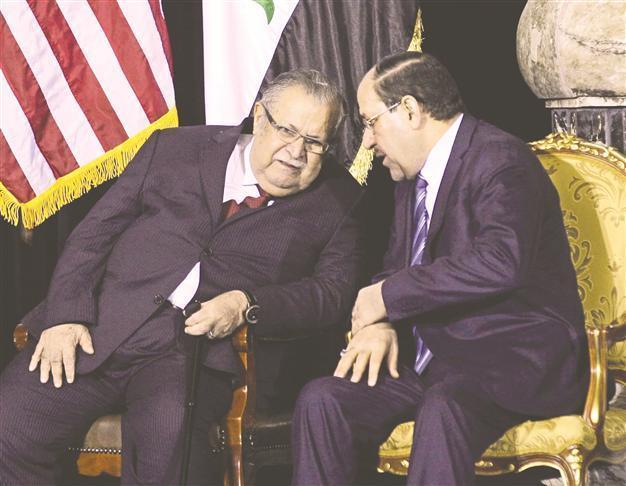Talabani in discussion with PKK for cease-fire
BAGHDAD / ARBIL

Iraqi President Talabani (L) and Iraqi Prime Minister al-Maliki chat during a special ceremony in this 2011 photo. Opponents fail to collect enough votes to oust al-Maliki. AP Photo
Iraq’s Kurdish-origin president has been holding negotiations with the outlawed Kurdistan Workers’ Party (
PKK) to urge them to declare a cease-fire, an official from the leader’s Patriotic Union of Kurdistan (PUK) said yesterday.
“[Jalal] Talabani is holding talks with PKK to convince them to declare a cease-fire,” Azad Jindyani, a PUK spokesman, was quoted as saying on the party’s website. “His initiative will continue until the clashes between Turkish army and the PKK have ceased. The results of this effort will soon [emerge],” he said. “The president believes peaceful means will bring the two sides closer,” he was quoted as saying by Anatolia news agency.
The spokesman said he thought clashes between
Turkey and the PKK would have a negative influence on northern Iraq and Iraq as a whole if they were not dealt with soon. His comments followed statements by Turkish Deputy Prime Minister Beşir Atalay on June 8 in which he said, “There are ongoing talks which even include the laying down and handing over of arms by the PKK.” Atalay also said terror was an international problem, adding that the Kurdistan Regional Government (KRG) in northern Iraq was at a “crossroads” and must “do something” against the PKK based on its territory.
Efforts ‘just started’Meanwhile, Iraqi Prime Minister Nouri al-Maliki’s opponents insisted their efforts had “just started” after they failed to collect enough votes to oust the premier. “Those who met today insisted that they will continue their efforts and the steps to achieve their goal,” a statement issued on the website of KRG president Masoud Barzani said of the gathering. The parties “will continue to call on parliamentary powers by legitimate means to face one-man rule ... and to condemn pressures exerted on members of Parliament.”
“It just started,” Shiite cleric Muqtada al-Sadr said when asked by a follower if the issue of withdrawing confidence from al-Maliki was over.
Haidar al-Mullah, a leading Iraqiya MP, told Agence France-Presse that “we are working to end the dictatorship” and that the required votes could be secured “in half an hour” if needed. There “were clear Iranian pressures” on the president and some MPs, Mullah added.
Kurds,
